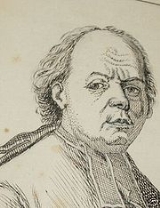
Claude-Adrien Nonnotte
Encyclopedia

Besançon
Besançon , is the capital and principal city of the Franche-Comté region in eastern France. It had a population of about 237,000 inhabitants in the metropolitan area in 2008...
, 29 July 1711; d. there, 3 September 1793) was a French Jesuit controversialist, best known for his writings against Voltaire
Voltaire
François-Marie Arouet , better known by the pen name Voltaire , was a French Enlightenment writer, historian and philosopher famous for his wit and for his advocacy of civil liberties, including freedom of religion, free trade and separation of church and state...
.
At nineteen he entered the Society of Jesus
Society of Jesus
The Society of Jesus is a Catholic male religious order that follows the teachings of the Catholic Church. The members are called Jesuits, and are also known colloquially as "God's Army" and as "The Company," these being references to founder Ignatius of Loyola's military background and a...
and preached at Amiens
Amiens
Amiens is a city and commune in northern France, north of Paris and south-west of Lille. It is the capital of the Somme department in Picardy...
, Versailles
Versailles
Versailles , a city renowned for its château, the Palace of Versailles, was the de facto capital of the kingdom of France for over a century, from 1682 to 1789. It is now a wealthy suburb of Paris and remains an important administrative and judicial centre...
, and Turin
Turin
Turin is a city and major business and cultural centre in northern Italy, capital of the Piedmont region, located mainly on the left bank of the Po River and surrounded by the Alpine arch. The population of the city proper is 909,193 while the population of the urban area is estimated by Eurostat...
. When Voltaire began to issue his Essai sur les moeurs (1754), an attack on Christianity, Nonnotte published, anonymously, the Examen critique ou Réfutation du livre des moeurs; and when Voltaire finished his publication (1758), Nonnotte revised his book, which he published at Avignon
Avignon
Avignon is a French commune in southeastern France in the départment of the Vaucluse bordered by the left bank of the Rhône river. Of the 94,787 inhabitants of the city on 1 January 2010, 12 000 live in the ancient town centre surrounded by its medieval ramparts.Often referred to as the...
(2 vols., 1762). He dealt with what he saw as historical and doctrinal errors contained in Voltaire's work. Nonnotte's work reached the sixth edition in 1774. Voltaire retorted in his Eclaircissements historiques, and for twenty years continued to attack Nonnotte.
Nonnotte's publication continued to circulate, and was translated into Italian, German, Polish, and Portuguese. After the suppression of the Jesuits, Nonnotte withdrew to Besançon and in 1779 added a third volume to the Erreurs de Voltaire, namely, L'esprit de Voltaire dans ses écrits, for which it was impossible to obtain the approval of the Paris censor. Against the Dictionnaire philosophique
Dictionnaire philosophique
The Dictionnaire philosophique is an encyclopedic dictionary published by Voltaire in 1764. The alphabetically arranged articles often criticize the Roman Catholic Church and other institutions. The first edition, released in June of 1764, went by the name of Dictionnaire Philosphique Portatif. It...
, in which Voltaire had recapitulated all his attacks on Christianity, Nonnotte published the Dictionnaire philosophique de la religion (Avignon, 1772), in which he replied to all the objections then brought against religion. The work was translated into Italian and German.
Towards the end of his life Nonnotte published Les philosophes des trois premiers siècles (Paris, 1789), in which he contrasted the ancient and the modern philosophers. The work was translated into German. He also wrote Lettre à un ami sur les honnêtetés littéraires (Paris, 1766), and Réponse aux Éclaircissements historiques et aux additions de Voltaire (Paris, 1774). These publications obtained for their author a eulogistic Brief from Clement XIII (1768), and the congratulations of St. Alphonsus Liguori
Alphonsus Liguori
Saint Alphonsus Maria de Liguori was an Italian Catholic bishop, spiritual writer, scholastic philosopher and theologian, and founder of the Redemptorists, an influential religious congregation...
, who declared that he had always at hand his "golden works" in which the chief truths of the Faith were defended with learning and propriety against the objections of Voltaire and his friends. Nonnotte was also the author of L'emploi de l'argent (Avignon, 1787), translated from Maffei; Le gouvernement des paroisses (posthumous, Paris, 1802). All were published under the title Oeuvres de Nonnotte (Besançon, 1819).

